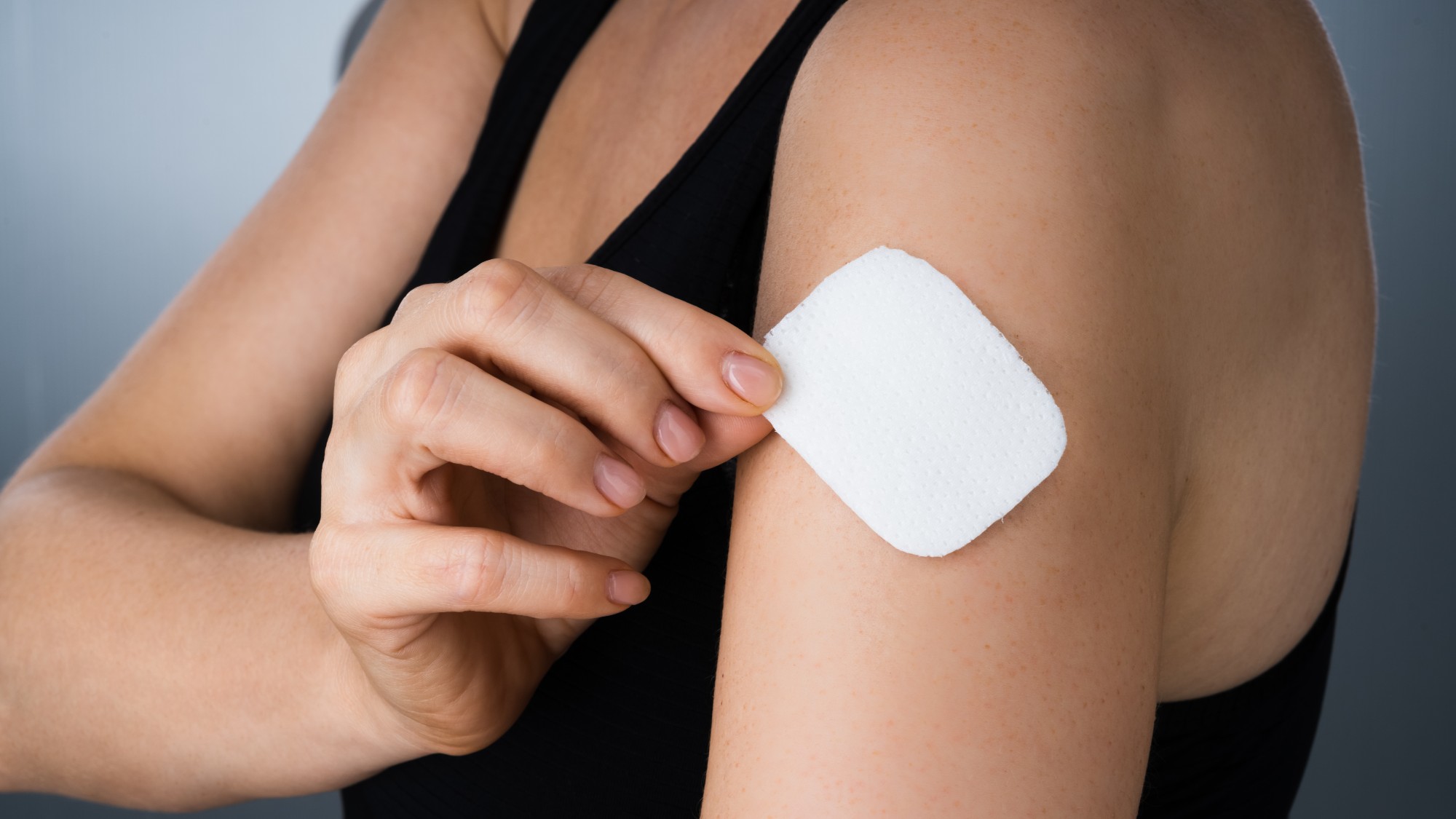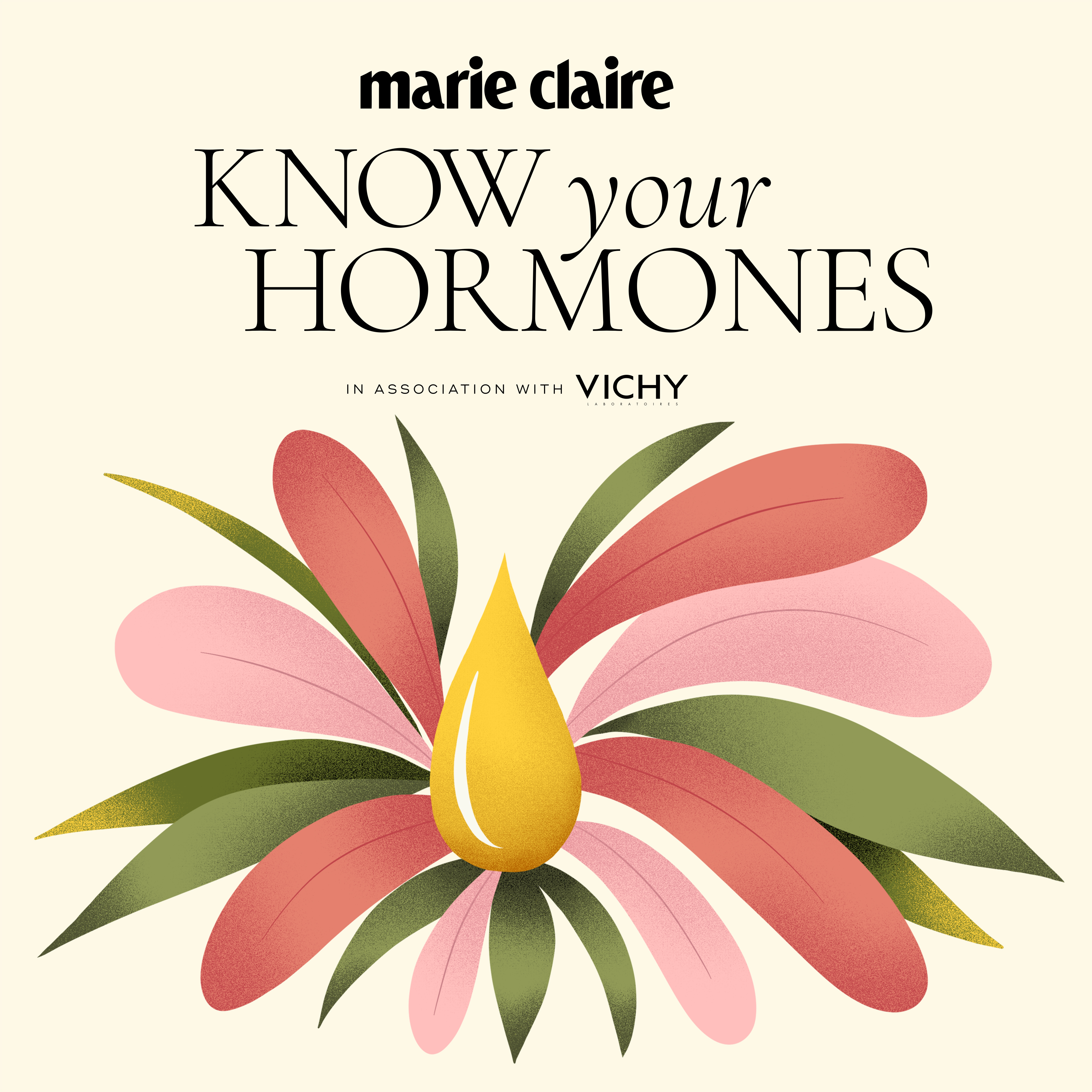What Davina McCall's perimenopause teaches us about the under-discussed women's health issue
The presenter's programme, Sex, Myths and the Menopause, covered her menopause journey in detail.


Alice Barraclough
From clever period tracking apps, to HRT treatment now being available over the counter, to working to better understand things like PMDD symptoms, we’ve come a long way when it comes to a frank discussion about women’s hormonal health. But there are some areas that are still little discussed, despite affecting almost all women – and perimenopause is one of them.
By 2025, over 1 billion women around the world will have experienced perimenopause, yet too often, the menopause is still a place of shame and woefully misunderstood. According to the Menopause and the Workplace report by the Fawcett Society and Channel 4, which was published in April this year – and polled 4,000 women aged 45-55 – almost half of the women haven't approached their GPs about the menopause and three in ten of those who have experienced delays in diagnosis. While data from Health and Her has revealed that one in 10 women have suicidal thoughts and 86 per cent suffer mental health issues as a direct result of perimenopause.
So, what exactly is perimenopause, and how do you know if you're experiencing symptoms?
Davina McCall's menopause
Thanks to Davina McCall and her ground-breaking 2021 documentary, Sex, Myths and the Menopause, menopause is beginning to move out of the shadows of stigma.
In the 60-minute Channel 4 documentary, the presenter candidly explained how she was told not to talk about the menopause at work, as it was somehow “a bit unsavoury”. She honestly discussed her symptoms – from brain fog to hot flushes (that made her question whether her make-up chair was heated) – she opened up about her hormone replacement therapy (HRT) and spoke to doctors and professionals about how, for many, menopause, early menopause, perimenopause – and the various treatments for all three – are still seen as taboo.
The programme was watched by more than 2 million people and resulted in 22,000 GPs and nurses volunteering to complete a six-hour menopause course. But most importantly, it inspired a wave of women to go to their GPs. Private healthcare company Bupa, which offers a personalised plan for women suffering symptoms related to the menopause, saw a threefold increase for its service. And requests for HRT skyrocketed – so much so, one pharmaceutical company reported a 30% rise in demand for HRT products the month after broadcast. They called it the “Davina effect”.
Davina McCall's perimenopause
McCall went through perimenopause at 44. To manage her symptoms, she started taking hormone replacement therapy, but shares that, at the time, she found it so embarrassing she told no one.
Marie Claire Newsletter
Celebrity news, beauty, fashion advice, and fascinating features, delivered straight to your inbox!
This is the whole point of the documentary – to start breaking down the many menopausal myths and smash the stigma that still surrounds the very natural occurrence.
Most people who identify as women will go through the menopause at some point in their lives, and so how we talk about it – and treat those experiencing it – has to change. Things are moving in the right direction, and the lack of both education and awareness slowly shifting, but more needs to be done.
Keep reading for everything you need to know about perimenopause, hormone replacement therapy – and guidance on when to see your GP.
A post shared by Davina McCall (@davinamccall)
A photo posted by on
Perimenopause: what is it?
According to best-selling author of Mindful Menopause, Sophie Fletcher, perimenopause simply refers to the symptoms you’ll experience in the months or years leading up to the menopause.
As per the NHS website, the “duration and severity of symptoms varies from woman to woman”, and symptoms can affect you both before and after you actually go through the menopause. “On average, most symptoms last around four years from your last period. However, around 1 in every 10 women experience them for up to twelve years,” the site reads.
“During perimenopause, your hormones start to shift,” Fletcher explains. “We are usually familiar with the decline of progesterone and oestrogen, but other hormones such as testosterone also dip and can have an impact on your mood, sex drive and general wellbeing.”
A post shared by Author of Period Power (@_maisiehill_)
A photo posted by on
At what age does the average woman go through perimenopause?
Good question – although, do note here, it does vary from person to person. “Everyone’s experience is different,” explains Fletcher.
“1 in 100 women experience it before the age of forty, and some girls go through it as early as their teens, though this is rare,” she shares.
Although Fletcher explains that it’s not that actually easy to define when your perimenopause starts. “Although hormones may start to decline earlier, most women don’t start to notice physical or emotional changes until their early to mid 40’s,” she explains. “Some people define it as when your periods start to change, but many women can experience effects of lower progesterone, such a low mood or depression, before this happens,” she goes on.
As per the NHS website, the menopause normally occurs between the ages of 45 and 55, and the average age the woman reaches menopause is 51.
Perimenopause symptoms: 15 to watch out for
Fletcher stresses that your symptoms – and perimenopause experiences generally – will depend on where in the perimenopause cycle you are.
However, during perimenopause, as progesterone and then oestrogen drops, she shares that you may experience:
- heightened anxiety
- mood swings
- depression
- low mood
- difficulty sleeping
- heavy periods
- headaches
- PMS
- dry itchy skin
- hair thinning
- joint pain
- weight gain
- sleep disturbances
- hot flushes
- vaginal dryness
And as perimenopause moves on? "Your oestrogen starts to drop more and other physical symptoms may begin to show," she explains. She does emphasise that treatment is simple and life-changing, so do visit your GP if you are experiencing any of the above symptoms.

What is hormone replacement therapy – and is it safe?
So you know what perimenopause is and how to identify the symptoms. But do you know how to treat your symptoms, should it come to it?
Again, as per the NHS website, hormone replacement therapy - the same HRT that Davina chats about being on - is often prescribed to 'relieve' menopause symptoms. They explain that it works by replacing hormones 'that are at a lower level as you approach the menopause'.
According to the UK's healthcare watchdog (NICE), about a million UK women use HRT treatment for their menopausal symptoms, and the numbers taking it are rising. It’s thought to help with hot flushes, night sweats, mood swings, loss of libido and more.
As with any medication, the choice to use HRT is an individual one and it doesn’t come without risks, but the official stance on HRT, despite the 2002 study’s findings, is that HRT ‘does not significantly increase the risk of cardiovascular disease (including heart disease and strokes) when started before 60 years of age’.
Current research finds that cancer risks are low in medical terms, while there are benefits, particularly from newer forms of HRT, in terms of lower Alzheimer’s and osteoporosis risks.
In fact, according to the previously mentioned Menopause and the Workplace report, 54% of women using HRT say it has given them their life back. Among women who have not tried it, low impact of menopause symptoms was the biggest reason (28% say this), while 24% said that they don’t know enough about HRT.
As Davina shares on her page, ‘it’s a really important conversation about the bigger picture and lack of awareness about the benefits of HRT even today.’
5 tips for managing your perimenopause symptoms
1. Educate yourself
You don’t have choices unless you learn about your options, shares Fletcher. "Menopause care can be patchy - being informed means that you can be proactive in asking for the right the support," she goes on.
Some experts, like Fletcher, prefer more integrative treatment methods, like meditation and self-care. Others, like Davina and the experts in Sex, Myths and the Menopause, will encourage you to opt for HRT.
Ultimately, it’s up to you what you decide to go for.
2. Get moving
Fletcher shares that your body should respond well to weight-bearing exercise during perimenopause.
"Think strength training, yoga and walking - these are all exercises that can improve both your emotional and physical well-being," she explains.
3. Practice self-care
Sounds simple, but can be really effective for dealing with the more annoying symptoms the menopause springs on you.
"Anything that helps with sleep, reducing anxiety or just generally makes you feel good is a plus," shares Fletcher. Our guide to the best self-care ideas might help.
4. Get appy
Period tracking apps can be a great way to stay in sync with your hormones, and many of them, like Clue and My Moontime, allow you to predict everything from productivity to mood swings based on your cycle. Tracking symptoms on a free, medically accurate app, like Balance, can really help to give you a full picture of your overall health. Scroll through the Balance app and you can see a whole host of symptoms, plus handy hints and tips on how to ease them.
5. Get support
Ultimately, the experts will know how best to help you and your symptoms, so do see your GP or a qualified expert if you need help.
"Even talking to friends can help - we just don’t talk about it enough," shares Fletcher. "The more we share, the more we can support each other."
In partnership with Vichy. Marie Claire created this content as part of a paid partnership with Vichy. The contents of this article are entirely independent and solely reflect the editorial opinion of Marie Claire.

Ally Head is Marie Claire UK's Senior Health and Sustainability Editor, nine-time marathoner, and Boston Qualifying runner. Day-to-day, she heads up all strategy for her pillars, working across commissioning, features, and e-commerce, reporting on the latest health updates, writing the must-read wellness content, and rounding up the genuinely sustainable and squat-proof gym leggings worth *adding to basket*. She also spearheads the brand's annual Women in Sport covers, interviewing and shooting the likes of Mary Earps, Millie Bright, Daryll Neita, and Lavaia Nielsen. She's won a BSME for her sustainability work, regularly hosts panels and presents for events like the Sustainability Awards, and is a stickler for a strong stat, too, seeing over nine million total impressions on the January 2023 Wellness Issue she oversaw. Follow Ally on Instagram for more or get in touch.
-
 Penn Badgley and Blake Lively kept their breakup a secret from the Gossip Girl cast and crew - here's what we know about their former relationship
Penn Badgley and Blake Lively kept their breakup a secret from the Gossip Girl cast and crew - here's what we know about their former relationshipBy Jenny Proudfoot
-
 Spring has finally sprung - 6 best outdoor workouts that are totally free and boost both body and mind
Spring has finally sprung - 6 best outdoor workouts that are totally free and boost both body and mindSoak in the nature and boost Vitamin D *and* endorphins.
By Anna Bartter
-
 This iconic rose perfume is a compliment magnet—it makes me feel ‘put together’ after just one spritz
This iconic rose perfume is a compliment magnet—it makes me feel ‘put together’ after just one spritzGrown-up and elegant, yet not at all dated.
By Denise Primbet
-
 How learning more about your hormones will change your life
How learning more about your hormones will change your lifeIn partnership with Vichy
By Alice Barraclough
-
 How to utilise the power of your period and sync your skincare routine to your cycle
How to utilise the power of your period and sync your skincare routine to your cycleIn partnership with Vichy
By Alice Barraclough
-
 The ultimate menopausal skincare routine, according to a dermatologist
The ultimate menopausal skincare routine, according to a dermatologistIn partnership with Vichy
By Alice Barraclough
-
 3 need-to-knows about your hormones we bet you didn't know
3 need-to-knows about your hormones we bet you didn't knowIn partnership with Vichy
By Alice Barraclough
-
 Menopause symptoms vary from person to person – here, three women share their own experiences
Menopause symptoms vary from person to person – here, three women share their own experiencesMenopause isn’t one size fits all.
By Alice Barraclough
-
 “Menopause gave me anxiety – how I took charge and reclaimed my mental health”
“Menopause gave me anxiety – how I took charge and reclaimed my mental health”Why do so many women struggle with their mental health during menopause? And what can you do if you’re feeling low?
By Alice Barraclough
-
 8 skincare ingredients that are great for hormonal skin, according to a dermatologist
8 skincare ingredients that are great for hormonal skin, according to a dermatologistIn partnership with Vichy
By Alice Barraclough
-
 Early menopause affects 5% of women: here's how to know if you're at risk
Early menopause affects 5% of women: here's how to know if you're at riskThink you may be suffering from early menopause?
By Ally Head